Thursday, August 25, 2005
Title: The Planet On The Table
Author: Kim Stanley Robinson
Publisher: Orbit
The Planet On The Table is a collection of short stories by the writer Kim Stanley Robinson. Published in 1986, gathering a range of material covering a period of a decade or so. As a collection of some of his earliest material it is particularly interesting to see how the themes he was working with then went on to feature so centrally in the novels that he made his name with - The Mars Trilogy (Red Mars, Green Mars and Blue Mars), Antarctica and Years Of Rice And Salt.
The book starts with an introduction by Robinson, who was living in Zurich at the time of publication. He advises that for best effect the reader should perhaps only read one story per day. Before describing a strange encounter with the statue of James Joyce in that city, and the conversation that resulted. From Zurich he takes us to Venice with his first story - Venice Drowned. Which as the title suggests is about a future where Venice has become submerged. Following a local diver as it takes tourists round the once great landmarks. They remove treasures, they feel it is preservation, he feels it is looting. Thematically Mercurial has similarities, an amateur detective becoming involved in a case of murder on Mercury. The white cliffs of Dover and famous paintings have been relocated to the planet, but when a recent arrival from Earth is murdered it would appear that things aren't as they seem.
Ridge Running is a more down to earth story for the most part, three old friends go ridge running. One is keen for action and to keep moving, one hasn't been running for years and is feeling the strain, and the third isn't what he used to be. Having been rebuilt after a car crash. In typical Robinson mode, the aspect of a man rebuilt is a background detail, the story really being about the people and how they get on, and how an event can change someone. The Disguise again picks up the themes of Venice Drowned and Mercurial, as actors perform recovered Jacobean plays in the year 2052, with the benefit of implants. But one actor has become stuck in character, becoming urban legend it is suggested he goes from tragic play to tragic play, and fiction becomes reality in his wake.
Lucky Strike is the first of a couple of stories that actually goes back in time, rather than dealing with artefacts from the past. The Lucky Strike is a bomber in World War II, the bomber chosen to drop a new weapon on the Japanese. Frank January is the man responsible for dropping the weapon, and he is not happy at all with this experimental device that will end the war. A story of emotional and conscientious struggle in a difficult situation. For me this was a particularly striking piece, though the fact that I coincidentally read it on the 60th anniversary of the events described certainly contributed to my reading.
From the past to the future and Coming Back To Dixieland, a group of bottom rung asteroid miners embrace the rediscovery of Jazz. Entering a music contest that could change their lives, and going up against all kinds of weird and wonderful instruments and genres with their retro style. This is followed by the Twilight Zone style Stone Eggs, about a man who has hit bottom and travels around America on a greyhound bus. Some strange and terrifying experiences resulting when he manages to get stuck at an isolated desert service station. The book finishes with Black Air, which apparently won a fantasy award at the time - the second trip backwards in time. Black Air follows a young orphan boy recruited from a monastery to help replace crew on an armada setting out to attack the English. A terrible trip ensues, with strange miracles along the way.
The stories here cover a range of topics, but the recurring theme is clearly that of the past and preservation. Over half the stories relating to aspects of this in one way or another - preservation, looting, cultural influence, how it shapes who we are and the necessity of keeping in touch with where we came from. The Planet On The Table is an interesting read for fans of Kim Stanley Robinson, though one that is likely to prove difficult to find - I came across a beat up old copy second hand.
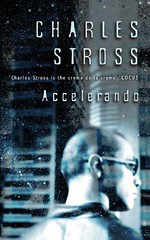
Title: Accelerando
Author: Charles Stross
Publisher: Orbit
Accelerando started life as a series of short stories, each one expanding on the life of the Macx family as the world entered singularity and accelerated culture. The material covers a period from 1999 to 2004, and represents some of author Charles Stross's best work, being collected as novel called Accelerando. Accelerando currently available in UK and US versions - not something that can be said about all of his work - while also being available for people to download and read for free at http://www.accelerando.org
The novel is split into three parts, each comprised of three chapters. Section one is the Slow Takeoff, where we meet Manfred Macx, who for me is the most memorable character in Accelerando. Manfred is a genius entrepreneur, who gives away million dollar ideas while travelling the world. As a result, Manfred is so widely respected that he has no need for money, all his flights, hotels, food and drink are paid by admirers and in return for favours. Giving him all the more time to remain a good number of steps ahead of the curve. Through Slow Takeoff we are introduced to Manfred (Lobsters), follow him as he becomes increasingly involved in politics and shaping the new future (Troubadour) and his brain expands to new and distributed levels of processing power (Tourist). Along the way we meet Pamela and Annette, the two women in his life. Pamela a fierce dominatrix and tax inspector, who feels that by not paying taxes Manfred is ripping off America and the future.
Annette has more influence in part 2, Point Of Inflection. Where we meet the next generation of Macx, Amber, Manfred's daughter by Pamela. The couple have split, and Pamela has given birth to the stored child after Manfred's departure. Without Manfred to dominate, Pamela has turned on Amber. Amber is desperate to get out, but is legally prevented from seeing her father to be able to ask for his help. So instead an escape is facilitated by Annette, and Manfred's robot cat. Which sees Amber's flight into space, aboard a manned flight to Jupiter. But Pamela is not content to let her daughter go. In Halo we meet Amber and fly to Jupiter, where Amber is forced to display that Macx ability. In Router alien signals have been received from space, and Amber assembles a crew to go and explore. While in Nightfall Amber deals with what she discovers out there, while the world she left behind is entirely transformed.
Part 3 equals Singularity. Amber returns from space, Manfred is a flock of pigeons, and the copy she has left behind has had a son. Enter the third generation of Macx, Sirhan. With each page of Accelerando the sphere of human affairs is nudged on another step beyond what we recognise. With Singularity being the coming to terms with the post-human, post-scarcity reality - where those who cling to flesh (however far removed from what we recognise as human) are backwards looking, as machines and post-economic systems vie for resources. Curator introduces us to Sirhan and its plans to preserve human history. Elector sees the Macx family and their fellow humans attempt to deal with the singularity and all its glory. While Survivor brings us through the other side, offering us that which remains.
Accelerando is perhaps one of the most convincing science fiction novels to have been written that covers a period of 100s of years and a period of mind boggling change. Starting us off with something we can recognise, the slow formation of now culture to tomorrow culture, in a manner that recalls the Good Old Fashioned Future/Holy Fire period work of Bruce Sterling, with a dose of respect culture/edge fashion ala Cory Doctorow. In this way Stross sinks his claws into the reader, and drags them screaming into a dizzying journey across time. In this process we have elements of Ken MacLeod's Space and Freedom politics, the threats of AI singularities. Edging towards a total overdose on dense Greg Egan headfucking post-humanity, while retaining the same easy going respect edge fashion that he started with.
Accelerando is an event novel. The kind of book that gets people talking and for good reason. The fact that much of the material has been out there in short form, and has been an introduction to the work of Charles Stross certainly helps. Though, it does cause problems in that the rest of his work running up to Accelerando is going to pale by comparison. And it isn't a work without flaws of its own - Stross still learning to become a better writer over the course of the work. While also following into the danger of cross generation fiction, in that Sirhan isn't as strong a character as Amber, who isn't as strong a character as Manfred. Though thankfully Sirhan is a reasonably minor character really, and Amber and Manfred's influence is present throughout.
To a degree Accelerando is likely to be, and should be, a huge influence on the genre - Stross's ability to tackle the subject matter, with such density, while remaining a personable and enjoyable read has to raise the bar. The result could go either way - either Accelerando will be noted and remembered in decades to come, or it will quickly be buried by books that try to meet the challenge. Regardless, and for now, Accelerando is one of this year's must read science fiction novels.
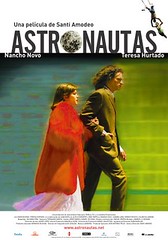
Title: Astronautas
Cast: Nancho Novo, Teresa Hurtado
Director:Santi Amodeo
When we meet Daniel he is locked in a barn, having paid to shepherds to make sure he stays there till he has come off of heroin. A 40 year-old man, with poor job prospects, recovering from 10 years of addiction, and determined to get his act together. While he may currently be clean, and following his own 10 step plan towards recovery, his doctor has no idea who he is, and things are a little rocky. This makes him a somewhat unpredictable man, given to fits of anger. So when Laura, a runaway girl, turns up on his doorstep, looking for her brother who lives next door to Daniel, he flies off the handle. But desperate to get his life in order, he gradually lets her in, and persuades her to help him.
Astronautas is a curious Spanish comedy from 2003, showing as one of a handful of films from the Edinburgh International Film Festival 2005 to be shown in Glasgow. There are points of comparison to Requiem For A Dream and perhaps Trainspotting - with the drug references, and the hallucinogenic scenes that result from trying to come clean. The animated sequences which define the ten step programme and offer odd little chapter headings are particularly reminiscent of the quirks of Requiem For A Dream. Though I haven't seen Breakfast At Tiffany's, I would suggest that the tagline "Think Breakfast At Tiffany's, only with methadone instead of martinis..." being used by the festival, is somewhat misleading - not least because there is no reference to methadone at any point.
But once the film gets going, the quirks in the film really come from the relationship between the 40-year-old ex-junkie and the 15-year-old runaway. A kind of odd couple relationship, as they play off each other, feeling out the limits and scope of who they are and how they interact. Filled with nice little scenes, like when Laura builds herself a bed out of books, or when Daniel takes care of his vinyl LPs, or when the two of them walk down the street together - him in his tweed coat, her in the bright red furry coat she shoplifted.
The film stars Nacho Novo as Daniel, one of the most well known Spanish actors, at least as far as I concerned - he appeared in two of Julio Medem's films (Red Squirrel and Lovers Of The Arctic Circle) and one of Pedro Almodóvar's (The Flower Of My Secret). By contrast this is the debut by Teresa Hurtado who plays Laura. This is the third film to be written and directed by Santi Amodeo, though it is the first that I have seen. As director he offers some nice touches, the way the camera follows the spinning records, the little animated sections which reflect the stages of Daniel's recovery and his previous work as an artist and poet.
Astronautas is a quirky film, full of character, with good performances from its two leads, which I quite enjoyed.
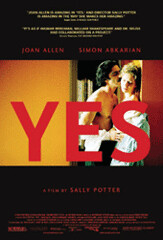
Title: Yes
Cast: Joan Allen, Simon Abkarian, Sam Neil, Shirley Henderson
Director:Sally Potter
Yes opens with a soliloquy to camera by the couple's maid (Shirley Henderson). In poetic terms she dishes the dirt on a crumpling relationship, while fishing an unfaithful condom from the toilet. It is through this veneer that we meet the collapsing couple. Joan Allen's character is listed as "She" in the credits, She and her husband played by Sam Neil are in the end stages of dysfunction. So when they go to a lavish function the husband ignores and isolates her, so She is approached by him. Simon Abkarian is credited as He, and working at the function He approaches her, propositioning this woman on her own.
From there She and He undertake a passionate affair. The film being entirely in verse entirely complimenting the sense of the relationship, as does the performance of the two leads. In film it is rare to see such theatrical performances, most often it will be an adaptation of Shakespeare, so something as contemporary and smart as Yes is quite refreshing and striking. Even if it does at times go a degree or two over the score.
But Yes is more than just the relationship between a man and a woman. It is about marriage, and how it can go wrong, compared with her friend, a single mother. It is about adultery and passion, the raw chemistry of a fresh encounter. It is about the clash of cultures, she is from Belfast and he is from Beirut. It is about Catholics and Muslims and Communists. It is about invisible people, the cleaners that pop up regularly throughout the film, and turn to the audience and offer little biting comments, or just telling looks.
To some degree Yes is a piece of experimental cinema, in that it is all grainy and filtered, regularly jerking and vibrating pictures, even when the camera is not moving. The film is told entirely in verse, layering at times, to deliver voice over monologues, internal running commentaries. Offering breaks in narrative as those cleaners turn and start to talk to the camera. With that Yes comes with mixed results - the narrative side is striking, though some of the tangents/monologues go on a little; while the jerky camera work can become annoying, and migraine inducing.
Sally Potter writes, directs and provides original music for her film. The soundtrack subtle and mostly enhancing, featuring her original music along with the likes of Kronos Quartet and Philip Glass. The film is mostly filmed in London, though over the course of the film we manage to take trips to somewhere in America, to Belfast, Beirut and Havana. Yes is consciously art cinema, and despite some of the issue discussed, I thoroughly enjoyed the film.
Wednesday, August 24, 2005
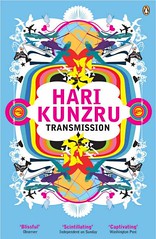
Title: Transmission
Author: Hari Kunzru
Publisher: Penguin
Arjun Mehta's parents are filled with joy when they find that he has been snapped up, and is to be flown to America to take on a prime IT role. However when he arrives in the US from India, he has a rude awakening, finding that instead of a lucrative contract he has instead signed a slave contract. One which pretty much takes all the money he might earn one way or the other, and closes off the option of returning to India with financial fines and the shame of returning to his family unfullfilled. Eventually he gets a position with an anti-virus software company, but as things are starting to come together there is a down turn in the market. What can he do to keep his job? Little it seems, till the biggest computer virus ever hits the world.
Transmission is the second novel by Hari Kunzru, following on from his debut The Impressionist. Kunzru was selected as one of Britain's top ten young novelist by Granta magazine in 2003. A selection that is made every ten years, and marked with a special issue of Granta featuring extracts by each of the 10 authors who have been selected. The inclusion of authors like Alan Warner and A.L. Kennedy who I am well familiar with was one of the reasons why I bought that collection. From that i was introduced to Nicola Barker, who has a novel out at the time, and Hari Kunzru, who had an extract from Transmission included. Though from the publication of that collection with the extract, it was another year before the hardback of the novel appeared, and only just recently that Transmission came out in paperback.
Transmission is split into two sections, the bulk of the novel comes under the heading "signal", which comprises something like 270 pages, and the last 20 or so pages act as something of an epilogue called "noise". Signal starts with the release of the virus Leela01, before flashing back to follow the creation of the virus, and the spread of the virus. In doing so it illustrates a certain snapshot of the modern world - Arjun part of the Indian boom in IT, his sister getting a job at a call center where she has to pretend to be Australian, Guy Swift a jingoistic marketing man on the brink, and Leela Zahir the latest star from Bollywood and the woman who inspired a virus.
Transmission is clever and contemporary, showing our dependance on computers and how easily it all could come crashing down. Something Kunzru does with insight and humour. The epilogue is particularly striking, the characters and events coming to a peak in the body of the book, Kunzru offers a neat extrapolation and closure of Transmission. Which demonstrates the novel at its most beautiful - memorable and remarkable and highly recommended.
Tuesday, August 23, 2005
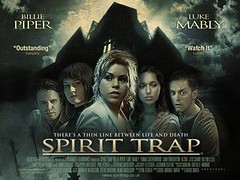
Title: Spirit Trap
Cast: Billie Piper, Luke Mably, Emma Catherwood, Sam Troughton, Alsou
Director:David Smith
Five students get a call at the start of term to let them know that a house has been found for them. It might be old, creepy and decrepit, but at least it is cheap. Upon moving into the house it is clear that something bad happened there in the past. The "spirit clock" and the "spirit writer" doodaa ouija board thingy they find on the first night don't help either. As the film goes on, it seems that each of the students has been picked, and that the house is a trap.
Spirit Trap is a British horror film, which entails the low budget and average acting that you would expect from that. Essentially it feels like a vehicle to promote the talent that is Billie Piper. If memory serves, Spirit Trap was filmed before she got her part in Doctor Who, but it certainly waited till after the success of the TV series before being given a general release.
Despite the expectations of a British film and the mediocrity that entails, I was surprised to find that Spirit Trap wasn't entirely crap. There were some nice dream sequences, the film demonstrated potential, and no one was allowed to over act too much.
So look forward to the poster now "Spirit Trap - not entirely crap" - re:mote voices. That'll be right.
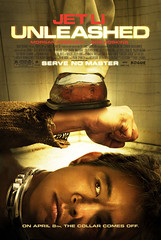
Title: Unleashed [aka. Danny The Dog]
Cast: Jet Li, Morgan Freeman, Bob Hoskins, Kerry Condon
Director:Louis Leterrier
Danny has been raised by gangsters since he was a child. They fed him, clothed him, treated him like a dog and trained him to kill. However effective the enforcement business is, it is not without its problems, and increasingly people keep trying to circumvent Danny. Which is how he comes to be wondering lost, convinced his master is dead. Bumping into a piano tuner, he is reminded of something from his childhood. Luckily the piano tuner and his adopted daughter take Danny in, and realising that he has serious developmental problems they strive to help him.
Unleashed, or Danny The Dog as it is originally titled, is an interesting role for Jet Li to be given. Li has done many memorable martial arts films from Hong Kong. But since he started doing films in Hollywood, his output has been particularly lamentable. Working with Zhang Yimou on Hero no doubt raised his profile once again, providing him with the opportunity to appear in this film penned by Luc Besson.
Interestingly Unleashed is filmed and set in Glasgow. So for this Glasgow audience there were a number of familiar sights to be seen. Though this fact actually got a little annoying at times, the audience having a constant conversation about how they recognised things, and just where is that. On the other hand, unless you are familiar with Glasgow, you probably wouldn't even notice. There is only one point where a reference is actually made to where the film is located, and for the most part I would be hard pushed to think of any point where you actually hear someone from Glasgow in the film. Bob Hoskins plays Li's gangster boss, and plays it as London as he plays everything else. Morgan Freeman plays the piano tuner, in Glasgow from New York while his step-daughter attends music school. Even the woman in the supermarket seemed to be more Cockney than Glaswegian. How bizarre.
Unleashed is flawed, when was the last time you saw something that wasn't, but it is certainly something a little bit different. Rather than by the book thrillers like Romeo Must Die or Cradle II The Grave, Unleashed is more interesting than that. Dwelling more on the aspects of a child raised to adulthood in an abusive and restricted manner. Which gives us a curious combination of the "stranger in a strange land" scenario, where the character finds everything new and fresh, and the "fight movie", where the character goes through a series of fights.
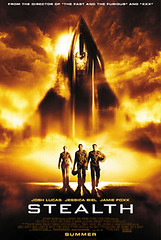
Title: Stealth
Cast: Josh Lucas, Jessica Biel, Jamie Foxx, Sam Shepard, Richard Roxburgh, Joe Morton
Director:Rob Cohen
From the 400 best pilots in the American navy, the 3 best fighter pilots have been selected for a special Stealth group. They are trained to take pre-emptive action against terrorists to protect America. However, this is only part of their brief, the real core of their mission is to help in the development of an unmanned, artificially intelligent fighter plane. Of course the plane is still at experimental stages, goes out of control, and only the 3 crack fighters can stop it.
The production/direction team behind Stealth have been involved with such stellar outings as xXx, xXx 2, and Fast And Furious. Which would tend to lead one to expect Stealth to be the funniest and cheesiest film you have seen in a long time. Much to my surprise, Stealth is, by comparison, a solid and serious piece of work. With only one or two particularly cheesy moments - most notably the fact that the AI plane has downloaded every MP3 on the internet, and chooses to listen to mediocre rock music, yes, quite.
Of course, Stealth takes an interesting initiative in these times of increasing political correctness. Casting a white man, a black man, a woman and a machine as the four leads. Where Stealth goes, I suspect others will follow, and we can look forward to more roles for machines in the future. Of course, and forgive the spoilers here, they still fall foul of the clichés - with the black man being the first character to die, and the machine being a baddy. When will they learn?
Stealth does for fighter planes what Fast And Furious did for racing cars. Big and brash, filled with action, and a pretty cast, with a fairly undemanding script.
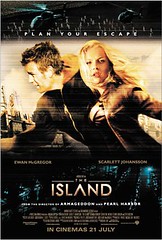
Title: The Island
Cast: Ewan McGregor, Scarlett Johansson, Djimon Hounsou, Sean Bean, Steve Buscemi
Director:Michael Bay
Catastrophe has left much of the world uninhabitable. Survivors are rehabilitated in an institute, where they are carefully kept in the best health, working towards a better future. Thanks to the work over the post-catastrophe years a paradise island has been made inhabitable. With a lottery being run regularly to allow people to move from the institute to the island.
Even without winning the lottery and a trip to the island, life is pretty good. But Lincoln Six Echo is having nightmares, and each day brings new questions. Despite the fact that things are structured for his benefit, they are actually restrictive. His clothing is controlled, all those eligible for the lottery wear white, the staff that keep things running wear black. He isn't allowed to eat bacon for breakfast, even though he wants to. And despite the closeness between him and Jordan Two Delta, they are forbidden from touching each other - men and women sleeping in separate wings.
Of course it becomes clear that things are not as they seem, and most folk will have seen in advance that this is a film about clones. Echo (McGregor) and Delta (Johannson) are in fact clones and the entire structure of their life is a lie. Something which becomes clear to Echo, triggering the usual switch from science fiction film with potential to big hollywood chase movie. Which is reflected by the dialogue, which becomes increasingly monosyllabic - McGregor and Johannson taking turns grunting "go" or "run", while people shoot at them and things blow up.
The Island starts with potential, taking elements from say Michael Marshall Smith's Spares and all sorts of material by Philip K. Dick. There are plenty of nice little touches in there, creating a sparse and crisp future, but increasingly those are outweighed by garish product placements. While post apocalypse and cloning ideas are pushed aside in favour of adventure. But then, really, that is to be expected, and The Island is what it is, loud and fast - a big action film that pretty much builds to velocity and keeps it going, so you never really have to stop and think about what is going on.
The highlight of the film is when McGregor meets McGregor, providing the clearest vision of the potential the film holds. Though the psychological issues that could have been dealt with never really come to the fore.
Saturday, August 20, 2005
Title: Dear Wendy
Cast: Jamie Bell, Bill Pullman, Michael Angarano, Danso Gordon, Novella Nelson, Chris Owen, Alison Pill, Mark Webber
Director:Thomas Vinterberg

Dear Wendy is a love letter to a gun, written as events come to a head, allowing for the film to flash backwards from that starting point to lead to crisis. And you know pretty quickly that this is the kind of film where things are going to go wrong sooner or later, you just know. Though, the thing with Dear Wendy is you don't know what is going to happen, and the key events that shape the ways things develop are pretty unpredictable.
Dick is an 18-year-old in a mining town, who has refused to follow his father into the mines. Instead he has a job in the local store, and is one of the town's losers. That is, until he finds Wendy. He thinks Wendy is a toy gun, until Steve who he works in the store with points out that in fact it is real. This brings the two losers together, pacifists with guns - they become obsessed with the details, the kinds of bullets, entry wounds, and exit wounds. Slowly they realise that by having guns, but not using guns, they are no longer losers - they have found a strength within themselves.
Having made this realisation, the pair decide to recruit the other losers in town, to offer them the same feeling of strength they have. Before long there are 5 of them, they call themselves the Dandies, and they have taken up residence in the old mine building, which they have renamed the Temple. There they hold rituals, learn about guns, and practice shooting, but never take their "partners" outside where they might "wake up". The result is exuberant, the group laugh and play, listen to music - creating their own little world. But as i say, we all know it can't last, and it doesn't.
Dear Wendy is a curious collaboration between two of the biggest names from the Dogme school of film making; though this is not a contribution to that series. The film is written by Lars von Trier, who did the second Dogme film Idiots, and more recently the challenging Dogville. While the direction is by Thomas Vinterberg, who directed the first Dogme film Festen, and more recently the quirky and memorably Its All About Love. In a lot of ways, despite Vinterberg insisting that he was in control, Dear Wendy bears clear marks of von Trier's influence. The action all takes place, more or less, on one square of town - the impression being that is the entire set, echoing Dogville's chalk outlines brought to life. In turn some of the characters tend towards von Trier's perception of American archetypes. Though, as Vinterberg has said, if von Trier had directed it Dear Wendy would have been a very different film. Not least because von Trier's script is reported to have had younger characters.
Cast wise we see Jamie Bell graduate from the noxious Billy Elliot to provide a pretty decent performance. The most obvious name actor is Bill Pullman, who puts in an appearance as the town's sherrif. With the rest of the cast seeing raised profiles for Chris Owen (Ladykillers), Danso Gordon (American History X), Mark Webber (Storytelling), Michael Angarano (Seabiscuit) and Alison Pill (Pieces Of April). Pill in particularly becoming something of a poster girl for the film, appearing on most of the imagery i've seen for the film's promotion.
I liked Dear Wendy, like the creator's other films it isn't straight forward or safe, but it has a definite charm and style, while being resolutely unpredictable.
Title: Azumi
Cast:Aya Ueto, Shun Oguri, Hiroki Narimiya, Kenji Kohashi, Takatoshi Kaneko, Yuma Ishigaki, Yasuomi Sano, Shinji Suzuki
Director:Ryuhei Kitamura
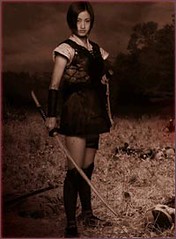
Azumi is found in the deser beside her dead mother as a little girl by a samurai master. He raises her with his other students to become a mast assasin, a task at which she excells. Ready to face the world, the group head out into the world, tasked with killing a series of samurai warlords intent on starting a war. Their mission is clear, their abilities special - kill the warlords and safe lives - do not become distracted, do not let others become aware of your abilities. Unfortunately with the death of the first warlord, the second warlord becomes aware that something is going on. So while the first kill was easy, the second is going to be a lot harder, with doubts creeping in as to the purpose of their mission making things more complex.
Azumi is a mixed bag of a film, pure B-movie material, the results strike the viewer as being particularly true to the sensibilities of the manga that it is based upon. There are the kind of logic jumps that seem to crop up in manga, regularly leaving me baffled and bemused, along with the entirely over the top comic book villains and heroes. Azumi and her friends are giggling teenagers, contrasting the highly skilled and disciplined assasins we are expected to believe them to be. While the villian is part slavering psychopath, and part cross dressing, heavily made up, rose carrying swordsman that we've seen often before.
With that is perhaps isn't a surprise that the fight scenes are comic book. Lots of swinging about and jumping, rather than the careful choreography of regular martial arts film. In the same way there is something ham about the violence, while there is plenty of blood, they seem to cut people off screen, only for them to step into camera range already covered in blood. Which seems a little curious given that it has recieved the full 18 rating for its UK release on DVD - given you don't really see anything other than someone with a prepared blood back, I would have thought a 15 rating would have covered it.
There are points where the film is comedic, perhaps unintentionally - like the point where Azumi and co walk into a village under attack by bandits and are ignored, or where a ninja turns up to give them a message and leaves saying "good luck guys!". On the other hand, the "monkey faced" ninja is clearly intended to be funny, and with the way people keep insulting him and he makes dog noises when annoyed, he is kind of funny.
One thing that I did find particularly interesting was the ambiguity found in some of the characters. Azumi's reaction to her mission and that of "monkey face" to the actions of the psychopathic swordsman emphasize the grey areas that exist within the plot - giving a little more depth to the polar extremes the comic book material might display.
Silly, throw away cinema, which while watchable doesn't really live up to the potential it had - coming across as being somewhat nostalgic/dated.
Title: Foreign Moon
Cast:Vicky Chen, Harrison Liu, Daming Chen
Director:Zeming Zhang
When Lan Lan arrives in London, she finds herself lost and helpless, her sponsor not having turned up to meet her. As a result she latches on to the first Chinese person that she comes across, Su Tong, who agrees to help her find her sponsor's house. Lan Lan has come to London to study the flute at music college, but the sponsorship she is recieving comes with an unexpected catch - she is expected to marry the man's son.
Appalled by this turn of events Lan Lan flees, running to the only other person she knows in London, Su Tong. Su Tong helps her get set up, and when he and his room mate set up an illegal chinese take away run from their bedsit she moves in to help out. But there are tensions, one woman living with two men - one of whom is young and always after a new woman, the other is older and waiting desperately for his wife and son to be allowed to join him from China.
Foreign Moon is clearly a low budget film, that looks dated now, and feels like a first feature for all those involved. Still it presents an interesting enough snapshot of London's Chinese community, and the lot of immigrants. There isn't a great depth, and the film seems to wander in an episodic manner at times, but there are scenes which seem to convey the ideas behind the story better than others.
Title: Worldcon - Interaction 2005
Detail: 4th-8th August 2005, SECC/Moat House, Glasgow
Part:7. Sunday.
Sunday 7th August 2005.
Sunday 10:00 AI: The Aliens We Make?
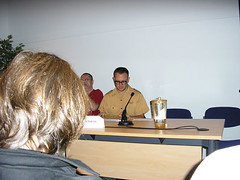
Cory Doctorow chaired this panel first thing on the Sunday morning. A panel that was supposed to feature David Gerrold, who didn’t make an appearance. Along with Tricia Sullivan, who we had already established hadn’t made the Con at all. This left Cory with Ian McDonald and Charlie Stross. Cory started the discussion by prompting Charlie to pass comment on his believe that corporations exhibit strange emergent behaviours, which could be described to be a form of artificial intelligence – an idea that is quite prominent in his novel Accelerando. From Stross to McDonald, and some commentary on his novel River Of Gods, which features aeias, and the Indian soap opera that they generate.
To add some perspective to the discussion about the requirements of intelligence Stross provided some statistics, including that the brain uses 20% of a person’s metabolic budget. So that “fuel” is always going to be an issue when dealing with the evolution of intelligence. From there the panel discussed whether humans really are particularly intelligent – with the suggestion that the entire race could really be coasting along on the coat tails of the 1 genius in a billion, the one who really pushes the boundaries back that next degree for us all to exploit.
Doctorow compared Asimov’s 3 law’s or robotics to an “autistic yearning for human emotion”, a yearning for a firm existence where people actually obeyed the rules. Though this was expanded to talk about how it represented Asimov’s fear of chaos, which stemmed from moving from Russia to America. From Asimov, the conversation moved on to Ray Kurzweil, who has been involved in the development of voice and image recognition. More recently becoming “evangelical”, as Stross put it, about emotional machines.
Ian McDonald made an observation about planes that can now take off and land by themselves, and how that might only be as intelligent as an insect, but it was still artificial intelligence. Stross talked about Ford paying MIT to develop cars with emotional sensors, that could react to the driver’s emotional state. While Doctorow mentioned call centre software that has been developed to recognise anger, and chances are that if you just shout “no” at the start of the process you will be put through to a human quicker.
Discussion covered ideas like the fact that there is no scientific evidence of a soul, and how often people working in that area have a goal in mind and set out about trying to support it. About how the mind works on the neurological level, or how if we can create split occurrences of an intelligence, how would we reconverge them?
Doctorow brought up the idea of aggregated I instead of AI, using online gaming as an example. How previous attempts at online AI had failed, with the solution that was found being to throw people with spare time at the problem. So that people play the parts of non-gaming roles, and they do so by entering a competition. Whereas, of course, if you tried to force people to take these roles, as part of their subscription, they would be appalled.
Then Stross started to talk about “spam blogs”, fake blogs created to get hits on engineers like Google, and generate traffic towards false sites. Examples of this can often be found on blogger’s recently updated site list daily posts containing nothing but a selection of key words designed to generate traffic. Doctorow talking about spam as being a generating cycle of an AI, and how it would not be surprising if the first AI to pass the Turing test were a spam bot.
Sunday 12:00 Genre Killing Ideas
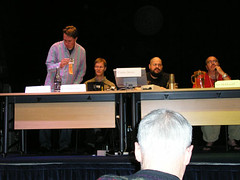
“The Singularity is this enormous turd that Vernor Vinge crapped into the punchbowl of SF writing, and now nobody wanting to take a drink can ignore it.”
So said Charlie Stross, which is why he became the moderator for a panel about genre killing ideas. A panel that included Alistair Reynolds, Ian McDonald and Karl Schroeder. One of the first definitions that was given of a genre killer was “something that makes your characters safer.”
The McDonald started talking about how constant sentience is quite a recent development in terms of humanity. How in the dark ages peasants sat in front of the fire and thought about nothing, as long as their “balls felt warm” they were happy. Which on reflection I’m not sure what that had to do with anything. Though I guess it was to demonstrate the idea that things like genre and the amount of books we have open to us are recent developments, and things are always changing.
Schroeder then talked about how he had been hired by the Canadian army the previous year to write a novella for them. The topic being about military and war in say twenty years time, but how everything he could think of could be solved with a mobile phone. Which the panel agreed was a good example of a plot killer – how many crime or horror novels could be scuppered with by a mobile? Stross observed how mobile phones could actually render stealth technology redundant with the use of celldar. Stealth technology involves redirecting waves that hit it, so that they don’t go back to the radar and pinpoint them, but at the same time mobile phone companies are looking to prevent outages in their coverage.
From celldar to camera phones, and how this almost creates a 24 hour recording culture; Bob Shaw’s Slow Glass was referenced as being something which had gone in this direction. With a webcam and broadband you can have planetary neighbourhood watch, apparently people create rotas of people who will watch their house of them while they are out. While it seems that a French cable channel transmits footage from CCTV cameras 23-hours a day so that unemployed people can sit at home and watch, and if they see a crime happen they can report it. From the abuses of things like webcameras and phone cameras, comes the idea of how porn drives technology, with Stross quoting a comment by Cory Doctorow about a million porn monkeys. Stross’s addition to that being “tits and ass all the way to the singularity”
The panel observed that science fiction writers could be slow to pick up on ideas, especially where the idea could undermine their work – the given example being how long before they acknowledged relativity. With this there were some stray thoughts. A conversation about Peter Watt’s and his novel Blindsight. Schroeder’s concerns that Bob The Builder includes neurotic AI, and who would actually programme a machine to think like that? To an autistic woman who works with animals in a slaughter house to reduce their anxiety, with the concern of how long would it be before this kind of theory was applied to humans.
Back on topic, the panel discussed the importance of limits in fiction - if there are no boundaries then it is hard to pin the story down. From there, do new ideas really kill ideas? Something like Time Travel can kill a genre, and to a degree Stross said he was exploring and making light of that idea in his novel Singularity Sky – where he did the equivalent of putting a Napoleonic fleet up against a nuclear submarine. This led to commentary on how corporate interest kills innovation, but without innovation the corporate is killed. Accompanied by the concept that new technology kills crime, while new technology finds ways round that. Which applied to fiction, suggests that there is a fine line between an idea that kills a genre and one that inspires it to new heights.
Sunday 13:00 The World We Are Making Now 2:Places
This was the second of 3 discussion about what we are doing the world today, and how that will effect the world of tomorrow, in particularly covering places – architecture, agriculture and infrastructure. The panel was chaired by Caroline Mullan, who managed to be quite abrupt and controlling, without actually explaining who she was and what her role in things was. She was joined by Joe Raftery, an architect/builder, who was involved in the millennium dome in London. Renee Sieber who had come from Canada, and was an urban planner and geographer. Yvonne Rowse an environmental officer, with a particular background in sewerage and water treatment works. Ian McDonald author of River Of Gods and Chaga, both of which have a kind of third world view of the planet. And Kim Stanley Robinson author of the Mars Trilogy, the Three Californias, and a contemporary series about environmental impact.
Raftery started the discussion, prompted by Mullan’s display of an architecture exhibit listed in her newspaper, talking about architects and how they like to talking about environmental design, but in the end are still interested in having lots of glass and steel. Then he talked about how hard it was to get the “clever” bits in a building to work. How so much is spent on design and build and then skimped on the actual commissioning of the finished product.
This was then passed on to Sieber, who developed the discussion, talking about the fragmentation of habitats. How these kind of building developments always want to be placed in isolation, with lots of green fields and extensive parking. McDonald talked about India, and how the software boom in Bangalore had transformed the city in to a series of gated communities, while he personally preferred the sprawl of Delhi. What he called the lattice versus the tree, Bangalore spreads out in branches like a tree, while Delhi interweaves communities, interlinking and nesting everything.
From India to England, and the proposals for the development of a Sprawl, the conversion of Barnsley into an Italian walled city. Which prompted McDonald’s suggestions that people come and see Barnsley’s “puke stained renaissance streets”. To a degree this highlights one of the big problems with building for tomorrow, in that we are building on yesterday.
The conversation was brought by to Rowse, and water. A lot of money is now being spent on using chemicals to clean water, while natural forms, like reservoirs are deemed too take up too much land, and presumably time. Though with this, we have the question of why are we using drinking water to water plants or to flush toilets? This evolved on to wind farms, inviting some debate from the audience as to the leakage involved in transporting electricity from remote locations versus the idea that these are the places with the most wind. This brought back discussion on the fragmentation of environments, and actions on a local level.
Kim Stanley Robinson was asked to talk about California, and his experience with how it had changed, compared to places like Shanghai (and Bangalore) that were undergoing that kind of change now. He talked about the greenery of Orange County, which were the focus of three of his novels, and how they quickly became suburbanised and industrialised. Pushing people like Robinson further out, ending up in an urban hippy community, the kind of place that never worked out. He talked about how much hippy writing had come from the period of about 1975-1980 that had dealt with environment and infrastructure, but had largely been ignored. Urban planners were more interested in Blade Runner, Neronmancer and Snow Crash.
Sieber recommended reading The Long Emergency, which talks about the future of post-oil infrastructure and urban planning. The conversation turned back to sewage once more, how places are using storm tanks to store sludge, and how when there is a storm the tanks overflow. London having experienced exactly that issue not that long ago, and lots of fish having died as a result. A member of the audience talked about new technology, and constant developments, how oil fields that were though to be dead could suddenly be reopened.
The panel headed for a break, discussing again money for construction but not for maintenance. How places like Shanghai are building towering blocks, without provision for sanitation. With the suggestion that as these places became business centres, and places for the rich to be for work, then these things would change – something evidenced 100s of years ago with the idea that “cholera doesn’t stay in the slums. With this, McDonald and Robinson had to leave after the hour for other panels and the like, though the other panellists remained on for those that wanted to take the discussion further.
Sunday 14:00 Cory Doctorow Reading
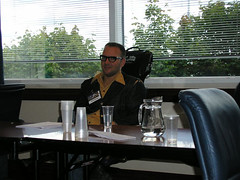
I took advantage of the break to head out, from the Armadillo back to the Moat House and the boardroom. Arriving, Doctorow was already there, sat back and relaxed behind the boardroom table – looking like he had fired the rest of the board and was preparing for world domination. When I arrived he was joking about pretending to read from Harry Potter and giving away spoilers if anyone arrived late. Then he explained how he wasn’t going to read from his new novel, Someone Comes To Town, Someone Leaves which is just out. Instead he was going to read from what he was working on now, since that was what interests him. This was from a novel with the working title “Theme Punk”, and you can hear his reading here.
Sunday 14:30 Signing
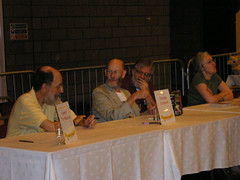
2.30pm I wandered into the dealer’s hall, where Susanna Clarke, Stanley Schmidt and Harry Tutrledove were signing.
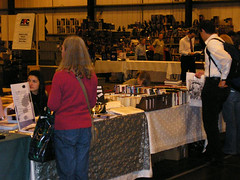
I had a wander about, buying some more books.
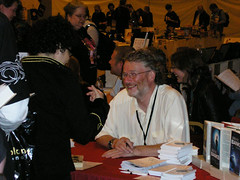
When arriving on Thursday night, there had been a sign saying that contrary to reports JK Rowling and Iain M. Banks would not be at Worldcon. A sign later went up from Banks’ publisher Orbit, saying that he would indeed be there and people could meet him at the Orbit table on Sunday at 2pm (he was still there the 40 minutes or so later when I went past)
Sunday 15:30 Signing
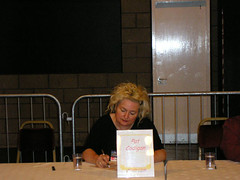
As Pat Cadigan had not been at pervious events when I had turned up, I didn’t expect to find her signing, so had left my books at home. But, she was there, signing. So I just got one of the little notepads Orbit were giving away signed as well.
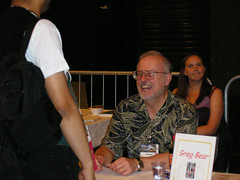
At the same time, Greg Bear was also signing.
Sunday 16:00 Karin Lowachee Reading
Between wandering about and the next event I grabbed my lunch, so I was sitting on one of the benches when I spotted Lowachee going towards the dealer’s hall on the run up to her reading. So I knew I had some time, and finished my lunch, watching for he heading back in the direction of her reading room. Lowachee’s books haven’t been published in the UK, which is likely one of he reasons why she had had a pretty quiet signing on the Saturday. I’d only heard her name recently from folk had read her stuff, and from her being on the panel about Race and Migration. She read a couple of selections from her new novel Cagebird, which follows space pirate and who he came to be who he was – first section was the character as a child, the second was from right at the start with the character in prison.
Sunday 17:00 Cyberpunks vs Humanists
This panel was supposed to feature Pat Cadigan, Paul McAuley and Justina Robson, all of whom I saw within hours of it’s starting time. However on arrival we were told it had been cancelled. Which scuppered my plans a little, given that the next event I was curious about was the Hugo awards 3 hours later. I bumped into the Norwegian girl from Thursday night, who was also at a loose end after the panels cancellation. We ended up meeting up with some other Norwegians, heading back into Glasgow for pizza and drinks. And that was us until about 11pm, and I had to head home for work the next morning.
Friday, August 19, 2005
Cast: Down And Out In The Magic Kingdom
Detail: Legup
Part: 1. and 2.
For those who enjoyed the reading by Cory Doctorow from his novel in progress, checkout the Legup blog, where Mark Forman is podcasting Cory's first novel Down And Out In The Magic Kingdom. He intends to read a chapter a week, with the prologue and first chapter being available for download at the moment. Keep checking his blog or use his feed to stay up to date with his reading progress.
Thursday, August 18, 2005
Re:mote Cast: Worldcon - Interaction 2005
Detail: 4th-8th August 2005, SECC/Moat House, Glasgow
Part:2. Paul McAuley Reading .
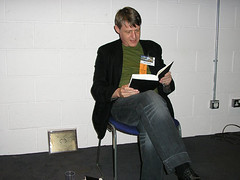
This is a recording of Paul McAuley reading from a short story and his new novel at the Interaction Worldcon in Glasgow. The story is called Meat, and was published in Nature magazine. His new novel is called Mind’s Eye, and is just out in hardback. His previous novel, White Devils, is recently available in paperback. See his site www.omegacom.demon.co.uk/ for more information.
Wednesday, August 17, 2005
Re:mote Cast: Worldcon - Interaction 2005
Detail: 4th-8th August 2005, SECC/Moat House, Glasgow
Part:1. Cory Doctorow Reading .

This is a recording of Cory Doctorow reading from a work in progress at the Interaction Worldcon in Glasgow. The book has a working title of "Theme Punks" and will be his fourth novel - his third "Someone Comes To Town, Someone Leaves Town" recently published in hardback. This new novel, and his previous novels - Down And Out In The Magic Kingdom and Eastern Standard Tribe - are available as downloads on Cory's site http://craphound.com.
Title: Worldcon - Interaction 2005
Detail: 4th-8th August 2005, SECC/Moat House, Glasgow
Part:6. Saturday.
Saturday 6th August 2005.
Saturday morning, and the first event in my evolving rough itinerary is at 10am. So it’s a case of get up and get ready, grabbing recharged batteries for digital camera and mini disc recorder, and replacing the books I got signed Friday with the books I plan to get signed Saturday. And off.
Saturday 10:00 Fractured: Is British Politics too Broken to Stay Together?
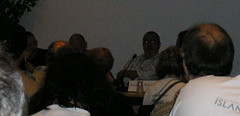
The first panel of the day wasn’t as busy as some of the ones I had been too before, but I came in sufficiently as it was starting to not be able to get a seat too close to the front. Hence the one crappy picture I got from this panel.
As with a number of panels that I ended up attending there was some overlap. So this panel to some degree fit with the Race/Migration panel from the previous day (the idea of language and religion and economic migrants) and the one that followed which was about The Future of Europe. The panel was made up of James Lovegrove, Ian R. MacLeod, Ian McDonald and Nicholas Whyte.
Both McDonald and Whyte have Irish backgrounds, so Ireland once again featured – how the split into Ireland and Northern Ireland changed things like football, and with Irish as one of the languages of Northern Ireland there was the generation of Ulster Scots for the other side.
That follows into religion, with some discussion of how an event like Guy Fawkes day is about the religious divide, and how comments are made on both sides about the conflict between Catholic and Protestants stemming from hundreds of years ago.
By contrast to the previous panel, the migrants being talked about this time were moving into mainland Europe, instead of those from mainland Europe coming into Britain. The contrast of how the poor come here for jobs and to fill skills shortages versus the better off Brits who by houses in Spain or France for the better weather. One of the conclusions regarding this idea was that it was a good thing, opening up Britain and allowing a wider viewpoint of the world and of Europe on the doorstep.
Regards government, there was some discussion about Scotland and Wales gaining more devolved power. How parties like the Conservatives are really a South of England party with very little real representation in the rest of the United Kingdom. Which brought discussion briefly back to Northern Ireland, and how the mainland UK parties had made no impact on Irish politics. In turn it was suggested the reason why regional assemblies in England have been turned down is because people prefer the idea of a remote government, one that can’t meddle in their affairs.
Saturday 11:00 Byzantium at our Borders in the 21st Century: the Future of Europe.
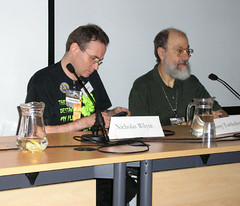
Nicholas Whyte chaired this panel, which was nominally about alternate histories and alternate futures. Though more specifically it was about Europe, the key events that have and will shape Europe, and how those could have been different. Harry Turtledove was present as a writer of alternate histories and as someone who comes from family driven out of Europe. Jon Courtenay Grimwood has also written alternate futures, and travelled round the world extensively. Keith Brooke seemed to have been given the role of insular Brit, he is a SF writer, though also the man behind the Infinity Plus website. Which leaves Patrick J. Gyger from the Swiss science fiction museum.
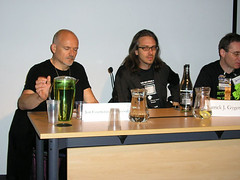
To some extent the discussion started with how European people felt. Despite being part of the European landmass Gyger insisted that Switzerland wasn’t part of Europe, with several audience members saying the same about their home of Norway. This led to discussion about borders and the development of Europe, and how these things are defined. Whyte works in the European parliament, and as well as having grown up in Ireland has also been involved with Yugoslavia and the resulting splinters that came from there – so he shared some of his insights into conflict and progress.
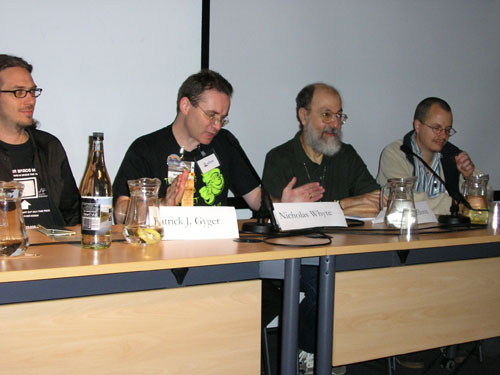
Developing the discussion in the direction of the alternate history base line, each member of the panel talked about what they considered to be key moments in European/World history and how those could have gone differently and what the effect might have been. If the UUSR had won the cold war. If the US and USSR had actually had a nuclear war. If World War II had started a little earlier. If World War I had been won by Germany, then we might have just finished the German century rather than the American.
One of the overall ideas was how little things have changed really. With the suggestion that the same powers that shaped the world 100 years ago are the same powers shaping it now; with the Austro-Hungarian Empire having been replaced by America in the scheme of things. From there, one of the biggest things affecting world borders today is the 3rd world versus 1st. Part of the conversation covering the debate over Turkey and whether it should join the European community, with Turtledove making the comparison between Turkey and Europe and Mexico and America.
Saturday 12:00 How do We Reinvent Time Travel?
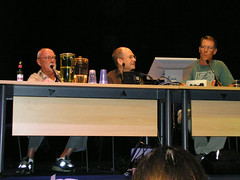
When discussing his part in the programme, Kim Stanley Robinson expressed an interest in time in the novel. Which is how he came to be moderating a panel on time travel. Though that wasn’t entirely what he had in mind.
The panel was made up of Stephen Baxter and Harry Harrison. Connie Willis failed to arrive, though Kim Stanley Robinson made a joke of it, holding imaginary conversations with her to talk about her work and the topic as a whole.
To a degree this panel overlaps with the concept of Sunday’s “Genre Killing Ideas” panel – starting from the idea of is time travel dead as an idea or not? In turn time travel overlaps with the previous panel, with the way that time travel and alternate history run as parallel concepts.
Discussion progressed to how methods of time travel. From the time machine as a literary device rather than coming from a scientific basis. To experiments with wormholes and the like, and how the latest science fad can be turned to provide some kind of scientific potential for time travel. From there came some discussion on paradox and on what periods people visit in fiction.
The panel talked about time travel novels, from their own experiments in the genre through to memorable contributions by other authors. Of course HG Wells’s Time Machine was mentioned, as was Stephen Baxter’s sequel to the Time Machine. Silverberg’s Up The Line was offered as an example, a was Philip K. Dick’s The Zap Gun and Connie Willis’s Speak To The Dog – each covering a different aspect of the conversation.
From the specifics of time travel, the panel evolved more in the direction of what Kim Stanley Robinson was really wanting to talk about – part of the gradual progression of his paneljack. His interest was in the passage of time in the novel – how in one novel five pages can cover 5 seconds of time or 5 millennia. One example of this Robinson suggested was Baxter’s Exultant, though Baxter in turn suggested that Robinson’s own Years Of Rice And Salt came into the same category. With this comes characters with extended life versus following a family over several generations and the strengths or weaknesses of each.
Which brought us round to Robinson’s real impetus and his achievement of paneljacking. With an explanation of how Olaf Stapledon had influenced the work of Virginia Wolfe. Stapledom as a fan of Wolfe had sent her a copy of one of his novels. The results of which could be seen, while Wolfe had started unconsciously to experiment with time in the novel, it wasn’t until after reading Stapledon that her work was transformed.
Saturday 13:00 Autographing
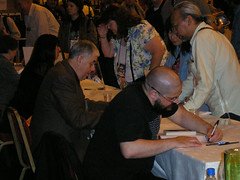
Charles Stross, James P Hogan, Liz Williams, Justina Robson signing 1pm
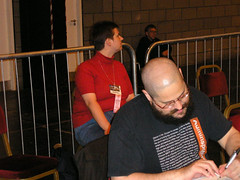
Charles Stross signing 1pm; having been reading an electronic copy of Stross's Accelerando, a series of short stories brought together as a novel, and thoroughly enjoying it, i decided to fork out the cash for a hardback copy of the book to get it signed by Charlie.
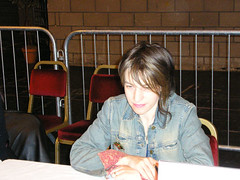
Justina Robson signing 1pm; I brought along a copy of Robson's novel Unnatural History to get signed.
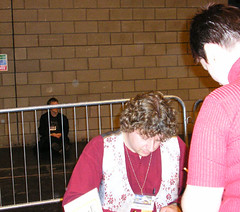
Peter Hamilton signing 1pm; having not actually read the last couple of novels by Hamilton I decided rather than bring along one of the novels i already have (especially since most of them are slabs), I would buy one of the couple I hadn't read and get that signed. Of course as tended to be the case, material by particular authors became scarce at the time they were signing. So i was left with the choice of a copy of Pandora's Star in poor condition or Misspent Youth, I opted for Misspent Youth - which Hamilton points out leads to Pandora's Star anyway.
Saturday 14:00 Autographing
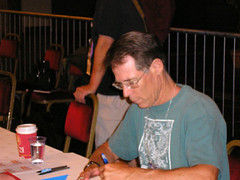
Kim Stanley Robinson signing 2pm; what to take to get Robinson to sign? A few folk had all three volumes in his Mars trilogy, some pretty impressive editions from the look of it. I decided to just take Red Mars, and the copy of his short story collection Planet On The Table, which i came across recently and had just finished reading.
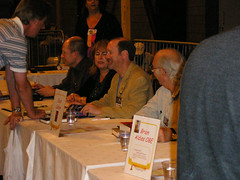
Stephen Baxter, Kevin J Anderson, Jack Cohen, with Brian Aldiss having been delayed - signing 2pm; I had meant to grab my copy of Baxter's short story collection that I have, but had managed to forget. Ho hum.
15:30 Autographing
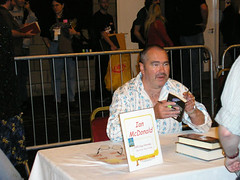
Ian McDonald signing 3.30pm; had managed to get a copy of River Of Gods signed while at the Kaffeeklatsch the previous day, but with the normal sized paperback just having been published I decided to pick up a copy of that and get it signed as a gift.
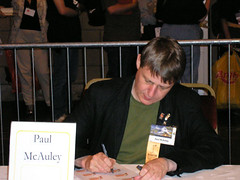
Paul McAuley signing 3.30pm; had brought a copy of White Devils with me to get signed, but decided after the previous days reading that I would pick up a hardback copy of Mind's Eye and get that signed as well.
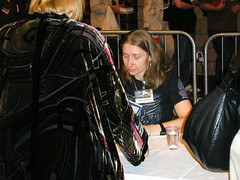
Steph Swainston signing 3.30pm
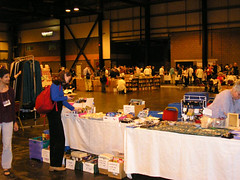
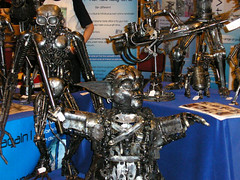
Signings dominated a good chunk of the afternoon, and since they are different from panels, in that you stand in line get your stuff signed and then move on, there was more time to kill. So I spent time between signings wandering about, and taking advantage of this really being my first full day in the dealers hall.
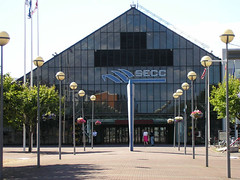
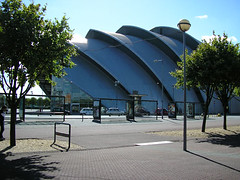
Having been to the days signings and bought what i was planning to buy for the day, I headed back out to the car park to drop off books instead of lugging them about!
Which is when I took these pictures of the convention venue - the SECC, Glasgow's busy spaceport, and the WSFS Armadillo who would launch on her maiden voyage at the end of the weekend, playing host to the Hugo awards on the Sunday night.
16:30 Reading Ian R. Macleod
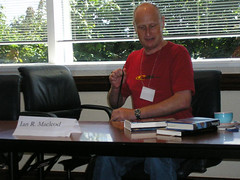
Ian R. MacLeod read in the boardroom, the bigger of the two reading rooms I was in over the weekend. He introduced himself by checking to make sure that he in the right room, apparently something he often has problems with as a lecturer in a college near Birmingham. He read two pieces, rambling on just like a lecturer in introduction of each piece. The first thing he read was an extract from a short story about the composer Elgar, which is in his Breathmoss collection of short stories. The second piece that followed was a section from his new novel House Of Storms, which is a sequel to one of his previous novels. I had been curious about MacLeod, having read several short stories in the annual Best New SF collections, like Breathmoss, and enjoyed them. Strangely, however, MacLeod was perhaps the only reading I was at over the course of the weekend where I was put off reading more of his work. Neither of the extracts struck me as being particularly my taste, which isn't to say I won't end up reading one of his books at some point anyway, but not for now.
Saturday 17:30 Reading Ian McDonald
After a short interval of half an hour, I was back to the boardroom again, this time for a reading by Ian McDonald. Similarly McDonald read two extracts, both related pieces. The first thing he read was a section from the story Little Goddess, which appeared in the June issue of Assimov, about a little girl raised to be a goddess. Which he followed by reading from the start of the first chapter of River Of Gods, which introduces McDonald's future India with a street gangster, painting a vivid picture of his novel.
After McDonald's reading and a last wander about I decided to head home rather than going straight to the room parties at the Hilton, like I had done the previous night. Thinking it would be a better idea to go home, get fed, washed, changed, perhaps have a nap, then head back out. But by the time I should have left to head back into Glasgow, I really was too tired and had been underwhelmed by the previous night anyway. So pretty much I was just ready to just sleep, so I did, allowing myself a better rest for another early start the next morning.
Title: Worldcon - Interaction 2005
Detail: 4th-8th August 2005, SECC/Moat House, Glasgow
Part:5. Friday.
Friday 5th August 2005.
The reason that Interaction as going to work with me getting a weekend ticket was that my office closes at 1pm on a Friday. If things had been running 100% smoothly then I would have gone straight from work. But of course, having decided at the last minute that I was going, meant that I was pretty disorganised. Of course the fact that several people were going on holiday that day, and were looking for me to stay on late to cover some stuff, rather made me all the more disorganised.
So it was more like 2pm by the time I got home, followed by a manic attempt to have lunch, locate the books I was planning to take to get signed for each day, get hold of my MD recorder plus microphone and borrow a digital camera for the rest of the weekend. All of which meant that it was after three by the time I arrived at the SECC. Arriving at the SECC I went straight to the information desk to see what my chances were for getting signed up to that afternoon’s Kaffeeklatsch. Much to my surprise and by sheer fluke I was able to get signed up for coffee with Ian McDonald, thanks to a couple of cancellations; I didn’t even see the lists for any of the other Kaffeeklatschs I was interested in, though the fact that a couple I was interested in were for cancelled guests probably explains that.
Friday 15:30 Autographing – Robert Silverberg, Esther Friesner & Tricia Sullivan
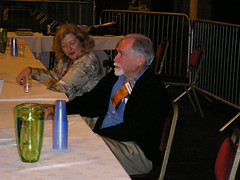
Given the way time was going this autographing session was the first item on my rough itinerary for Friday that I could make. Still at that finding your bearings now that everything is open stage, so managed to find a large queue for signing, though that turned out to be Tolkien related. Instead the signing I was after was down the other end of the SECC in the dealer’s hall. There I found only two people ready to sign instead of the listed three.
I have read two novels by Tricia Sullivan, Maul and Dreaming In Smoke, and I had decided that I would buy her latest novel Double Vision from one of the stalls and get that signed. However the person that was missing from this signing session was Sullivan. Which knocked a couple of events from my itinerary – like the reading by Sullivan and the Kaffeeklatsch. Though at least I managed to pick up a couple of her older, and I believe out of print, novels for a good price over the course of the weekend.
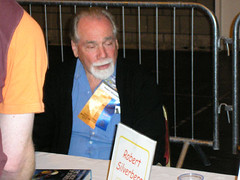
Of the remaining two, that left Robert Silverberg for me. During my teens I read dozens of novels by Silverberg, who has been in the industry for something like 4 or 5 decades now. So he was one of the first real science fiction writers that I had read. I decided to take along the first volume in the series of short story collections that he has published in recent years, and got him to sign that.
Friday 16:00 Kathleen Ann Goonan Reading
Looking through the official guide, I realised that I had some how missed Kathleen Ann Goonan from my scheduling, so was pleased to spot that she was doing a reading and that I had spotted it just in time. I’ve read the four novels Goonan has had published in the UK, though I was hoping to get a chance to pick up the third novel of four which hadn’t been printed here (as far as I am aware). However after finding the room the reading was to take place in, it became clear that Goonan was to join Sullivan and be my second cancellation of the weekend.
Friday 16:30 Paul McAuley Reading

After killing a little time with the non-reading by KAG, I was back to the same room for 16:30, and a reading by the British science fiction writer Paul McAuley, and one of the hosts for this year’s Hugo Awards. The Fyne room is a smaller venue than the boardroom, which I had been in the night before. But then it was surprising for an event like this that there were not more people there to hear McAuley read.
He started by reading from a short story called Meat, which was published in Nature magazines second Science Fiction story issue – and is apparently available online with a number of other stories. Followed by a couple of extracts from his new novel, Mind’s Eye, copies of which were available in hard back from the dealer’s hall. Sound like it is going to be something of a thriller, lots of shadowy organisations and secret service types, set between London and Iraq.
Friday 17:00 Ian McDonald Kaffeeklatsch
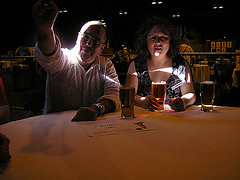
Having fluked a place on the Kaffeeklatsch with Ian McDonald, I wasn’t actually sure what to expect. In the hall that held the information desk, future con bids, assorted costume/displays, was a coffee bar – at the back of which were a handful of cordoned off tables. Each table for a guest and 9 fans to sit down, have coffee and chat. Most of us had sat down at the table before McDonald arrived, and had come to the conclusion that none of us had done one of these before. Ian and Enid arrived with a handful of fans from Belfast, and announced that he had never done one of these before either.
I guess Kaffeeklatschs on the whole are intended to be pretty freeform and casual affairs. Sat as a group with Ian McDonald for an hour, we were certainly pretty casual about the whole thing. We all sat with drinks and had a rambling chat – covering McDonald’s Hugo nominated novel River Of Gods and his trip to India to research the novel. How his latest novel is going to be about Brazil, and how much harder it is to research Brazil than India – as far as South America goes thee are dozens of books about Cuba, but not nearly s many about Brazil, despite its size. Then we talked about the theory of how writers become writers after moving as children, and how he moved from England to Northern Ireland as a child, and how the whole environment of Northern Ireland has affected his writing. To a degree this extended into the current troubles in London, and the current state of Britain on the whole.
The whole thing was a little bizarre, but Ian McDonald is a fun and easygoing guy, so the whole session was pretty relaxed.
Friday 18:00 Race, Migration and Refugees
This panel had just started when I arrived, so I kind of missed the introductions, going by what was said through the course of the conversation the panel was moderated by Fiona Avery – who seems to have written a good number of comics and tv-tie in work, with her first novel being published this year. Sat to the right of her was Elizabeth Wein, who has written a handful of young adult novels. Then to the left of Avery was Karin Lowachee, who has written three novels. For the most part, I wasn’t too aware of who these three women were. Unfortunately the fourth woman on the panel was supposed to be Kathleen Ann Goonan, who we had already established was not present. The rest of the panel was made up by Jon Courtenay Grimwood, who has just published his eighth novel, and the late arriving Ian McDonald, who I had managed to overtake on the way there.
The panel started by giving us some idea of who the people were, and how their experiences had shaped their writing. Fiona Avery has spent time working in Egypt and is a Cultural Anthropologist. Elizabeth Wein has lived in England, Jamaica, America, and is now in Scotland. Karin Lowachee was born in South America and now lives in Canada. Ian McDonald moved from England to Northern Island, where he lives now. Jon Courtenay Grimwood was born to a Service family, moving about Europe and the Far East as a child.
Major topics in this discussion revolved around reasons for people migrating, how they become refugees. The obvious suggestions that were come up with were things like religion, war and money. The rise of one religion causing the flow of another. The differences between Western and Eastern Europe and the skills gaps versus the money that is available.
Grimwood and McDonald both talked about how they immersed themselves in a culture to be able to write about that culture – listening to that culture’s music, cooking and eating the food. While Avery talked about buying a playstation so she could connect to a certain generation. The topic spread to other research methods – the use of journals, the availability of books, and just generally how much tools like the internet have made life as a writer so much easier.
The discussion moved on to language, from researching authentic language, to how the form of a language can affect dialogue and narrative. McDonald explained how Irish doesn’t have words for “yes” or “no”, which can make for circular conversations. Wein agreed with McDonald, having experienced a similar phenomena while living in Ethiopia. The panel headed towards a conclusion with some comments about puns and words games and how they fit into language.
Friday 19:00 Pro-Am Technobabble
Like “I’m sorry I Haven’t Any SFing Clue” this was a panel quiz game with an emphasis on humour. Split into two teams, the professionals (SF writers) and amateurs (SF reviewers/fans). The line up listed at various points for the teams had changed at least once before the start of the event. In the end the only people I really recognised were Charles Stross and Simon Bisson. Like the previous night, this event had science fiction sound effects for the teams to guess. There was also a steady stream of people leaving throughout, and I have to admit that eventually I got bored and left as well. I may be a science fiction fan, but I think that was for the way more serious Fan.
Friday 20:00 Parties
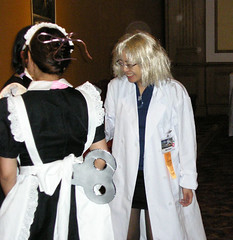
This is where I failed the intelligence test, or at least the “have you been paying enough attention” test. For some reason I got it into my head that the parties were in the Moat House hotel. Without a real idea of what the parties involved I thought I had better grab something to eat. So I got one of the over priced bottom of the barrel toasted sandwich doodaas that the SECC catering were selling. Which was over priced and bottom of the barrel. I then wandered around trying to find the parties. Till something in the back of my head said “the parties are in the Hilton stupid!”. And the back of my head was right, the parties were in the Hilton and I was stupid. Which I’ve I’d realised sooner I could actually have just gone into town and gotten something proper to eat.
Being at the convention by myself made things a little awkward at times. People were easy enough to talk to while waiting to get something signed or while sitting in the audience of a panel. But I found the parties a little more difficult than that. Perhaps turning up about 8 when things were still kicking off wasn’t a great idea. Still I managed to wander around from room to room for a good few hours. I drank fizzy drinks with the Friendly Norwegians. I caught the presentation about Fantastic Queensland, the Australian equivalent of the Clarion writer’s workshops, and the raffle that they held. I ate Norwegian pancakes. And hot dogs from the Chicago 2008 bid. I ate Norwegian sweets and chocolate. And a variety of Japanese crackers and snacks from the LACon IV & Nippon 2007 party. Eventually I became tired, I’d still been at work all week, and was planning to make an early start the next morning to make the most of the rest of the weekend.
Saturday, August 13, 2005
Title: Worldcon - Interaction 2005
Detail: 4th-8th August 2005, SECC/Moat House, Glasgow
Part:4. Thursday.
Thursday 4th August 2005.
I stopped work, and got home about 5pm. Went through the process of getting ready, and managed to get to the SECC for Interaction about 6.30pm. Where I signed up for my weekend ticket, and had a brief wander of the sign up hall, while flicking through the booklets. For me the booklets, both guide and souvenir were somewhat disappointing - neither really has a guide to who everyone is, which I would have thought of as an essential item at an event of this size, and some of the layout of the guide led to flicking back and forward just trying to keep up with what day's listings you are looking at. While I'm on the negatives, I might as well get those out of the way. Arriving on the Thursday night, I was frustrated to find that the information desk had already closed for the day, and to a lesser extent that the dealer's hall had also already closed.
Thursday 19:00 You Can't Copyright My DNA, Can You?
This was the first item on the itinerary I had roughed out for the weekend that I reckoned I was both interested in and could make. The panel was hosted by SF writer Ken MacLeod, with his fellow SF writers Richard Morgan and Alistair Reynolds - who all managed to show themselves up really. The other guests, Andrew Adams and Carolina Gomez Lagerlof being the experts in the field, backed up by some audience members who obviously had direct experience of the particular topic.
The discussion started with a clarification, covering the differences between copyright and patenting. You cannot copyright genetic material, though you can patent. Conversation ranged across the issues related to the topic, from the way corporations are currently dealing with this kind of material, and how it affects people, to the possibilities of this kind of field being opened to amateurs. One partial conclusion that was come to was that the current practice does not seem to be particularly sustainable.
William Gibson was quoted for the first time, with his idea that "the street finds its uses" being one that cropped up on a number of panels. One illustration of this was the example of the original Chinese Harry Potter novel that was put together to meet a demand. Richard Morgan suggested that we might be able to augment the human model with loaded chromosomes, though that was met with the suggestion that a whole new meaning would be given to the idea of "the blue screen of death" in these circumstances.
As the conversation evolved one of the major topics was the mis-use of technology, the whole street use idea. With one of the panellists suggesting that we were reaching a point where Universities would be vetting candidates before allowing them to learn the kind of advanced biotech processes which would allow the engineering of a virus. The suggestion being that there was perhaps more to cause for concern from a well trained biologist or chemist and the increasing streaming of technology which will allow home production, than your average suicide bomber. Though the idea of home made biochem product has cropped up in the past, partly with things like the drug trade, and in some of the novels by SF writers like Paul McAuley.
Thursday 20:00
After the DNA panel I had put a tentative mark against the The Military: Making It Authentic panel. But decided as I had pretty much gone straight to the first panel that I might be better served by doing a full wonder and getting an idea of where everything was, rather than going to a panel I wasn't too bothered about.
Which is when I made the discovery that the information desk wasn't open, and with work in the morning it looked like there was no chance of getting signed up for any of the Kaffeklatsch I had hoped to get on to. Again I thought that scooping out the dealer's hall and getting a feel for stock and prices would be good, but again that was closed. The SECC at this sort of time was starting to feel a little abandoned; as I had no intention of going to parties that night, I wasn't really aware that most of those started at 20:00, likely accounting for the sparseness of the hall.
It was about then that I had my first encounter with the Norwegians, bumping into a Norwegian girl, who like myself was feeling a little bit lost. We talked briefly, before she wandered off to find more Norwegians, and I wandered off to find something else to do.
Thursday 21:00 Ellen Kushner Reading
Having decided I probably stood little chance of winning chocolate for answering trivia questions, and that I wasn't too interested in Church State & Academia, I opted to got to a reading by Ellen Kushner. Kushner was reading in the boardroom in the Moathouse hotel, linked to the SECC by a corridor. I had no idea who Kushner was, just really turning up on the off chance. Turns out that she is a fantasy writer, seemingly in the bodice ripper/sex and the city mould - to the extent that she joked about wanting to call her next novel "Sword In The City", and trying to avoid a spoiler in her reading by referring to a character as "lord big". Strangely her editor had ignored the "Sword In The City" suggestion, and the novel, due out sometime next year looks likely to be called The Privilege of The Sword, or something equally not much better.
Kushner read a couple of selections from this forthcoming novel, with a room full of fans that were warmly encouraging towards her enthusiastic reading. This reading underlines why readings can work so well - for me reading at home is usually a case of trying to fit in as many pages as I can in the window of free time I have, and get on to something else on the ever growing unread pile - but when you get a session like this, you get the author taking the time to pace it and add the inflections that you don't always realise were intended. So that while Kushner's material might not be my kind of thing, I still managed to enjoy and thoroughly appreciate her reading.
Thursday 22:00 I'm sorry I Haven't Any SFing Clue
This was again in the moat house, this time in the Argyll room at the back of the lobby bar. Based on a BBC radio panel quiz game, I reckoned that this could be some fun, and mostly it was a pretty good laugh. The panel were split into two teams, guest of honour Christopher Priest and Ben Jeapes against Ken MacLeod and John Meaney, hosted by Tony Keen (Note - I may have Jeapes and Keen round the wrong way, can't entirely remember which was which).
The quiz covered rounds where each team had a Hugo nominated novel to give clues for the other team to guess, science fiction words given new and humorous definitions, and name that tune, which had the whole audience chanting the theme to Doctor Who for the panel to guess. For the most part I was amused, though half of this event went over my head - a combination of being entirely unfamiliar with the references to the format that the whole thing was based on, and just not being as up on the material actually being covered.
Title: Worldcon - Interaction 2005
Detail: 4th-8th August 2005, SECC/Moat House, Glasgow
Part:3. Intro.
While I am a science fiction fan, and it is something I have been reading for years, I have to say that I don't really follow the events and conventions that go with fandom. Which would explain why it was so late in the day when I found out that there was an annual science fiction convention and that this year it was located locally to me in Glasgow; it was even later, like at the event itself, that I discovered that the same event had in fact been in Glasgow 10 years earlier as well.
At the time I found out about Interaction, the 63rd World Science Fiction Convention and 2005 Eurocon, I was impressed by the number of authors that I like who were all going to be in the one place. However at that point I was between jobs, and funds were a little short for something on this scale. As it got closer I started a new job, and money started coming back in again. The amount of money involved was still a factor, as was the fact that if I was going I was going without knowing anyone there (even if it was local), and the balance of things I was interested also seemed to be outweighed by things I wasn't interested in. To some degree I was talking myself out of it.
Which didn't stop me from joining in the discussion group on Interaction, and chipping in my tuppence whenever a question came up that I could answer. Which of course keeps the whole thing in my sights, until the actual event comes round. Which is how it came to be that I started to make the decision that perhaps I was going to go a couple of days before hand. Coming round the night before, to a definite decision that in fact I was going to go after all. But in doing so, I was going to have to fit it in around my work hours. Which no doubt means I missed a lot, but I did my best to pack as much as I could into the time.
 this is the voice of re:mote induction.
this is the voice of re:mote induction.